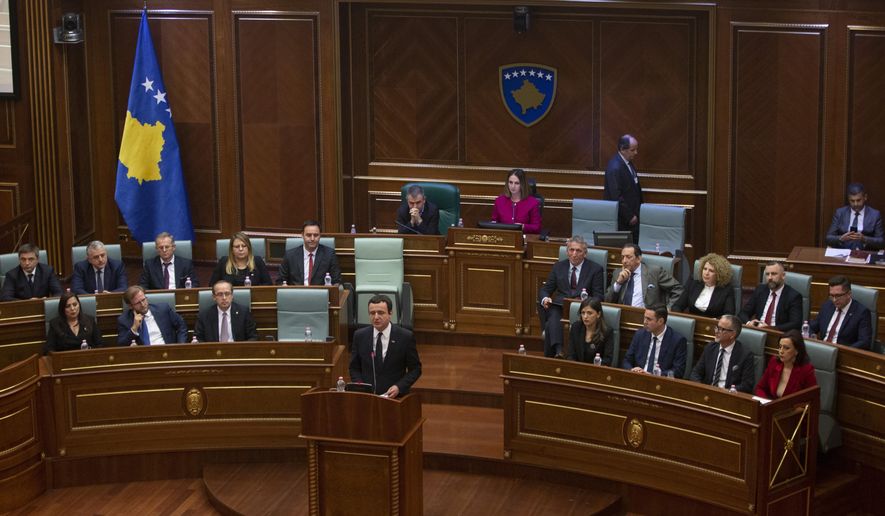TIRANA, Albania (AP) - The decision of Kosovo’s government to phase out the country’s 100% tariff on imports from Serbia and Bosnia-Herzegovina starting Wednesday did not ease international pressure on the tiny Western Balkans country and sparked more domestic tensions.
Although the United States and the European Union had pushed for lifting the import taxes, Prime Minister Albin Kurti announced early Wednesday that his caretaker Cabinet would instead require goods from Serbia to be certified for quality, a mandate already in place for Kosovar products shipped to Serbia.
Marko Djuric, head of Serbia’s office for Kosovo, rejected Kurti’s move, saying “the situation did not deescalate or return to the previous state when uncivilized taxes were introduced.”
Kosovo imposed the punitive tariffs in November 2018 over Serbian efforts to block Kosovo from joining international organizations. The dispute led to the suspension of European Union-mediated talks to normalize ties between Pristina and Belgrade.
Most Serb goods stopped arriving in Kosovo after the import taxes were introduced, except for products that were mainly smuggled into Kosovo’s Serb-dominated Mitrovica.
Annual trade between Serbia and Kosovo was valued at about 400 million euros ($440 million) before the tariffs were adopted, and inflation in Kosovo rose to about 3% in 2019 after the import taxes took effect compared to 1.1% the previous year.
Kosovo was formerly a part of Serbia and won independence after a 1999 NATO bombing campaign that ended a bloody Serb crackdown on an armed uprising by members of Kosovo’s ethnic Albanian majority. Serbia refuses to accept Kosovo’s 2008 declaration of independence.
Since the start of the Pristina-Belgrade talks in 2011, 33 deals have been signed to ensure the country’s recognition each other in areas such as education and professional degrees.
Kosovo claims Serbia has not fulfilled its side of the agreements. Kosovo recognizes diplomas from Serbian universities, but Serbia does not accept the degrees of Kosovar university graduates. It’s the same with drivers’ licenses.
Kurti said the government would monitor whether Serbia moves toward reciprocity until June 15 and if not, the tariffs will be restored.
The junior partner in Kurti’s coalition government, the Democratic League of Kosovo, or LDK, initiated a successful parliamentary vote of no-confidence vote in his Cabinet last week. His government now is acting in a caretaker capacity.
The motion came after an LDK minister was fired for not supporting the restrictions on movement the government imposed to stem the spread of the coronavirus.
The LDK also wanted Kurti to fully revoke the 100% tariff and not damage ties with the Kosovo’s most important ally, the United States.
The United States argued that Kurti’s actions would strangle Kosovo’s economy.
“We remain opposed to the latest move to implement reciprocal measures on the movement of goods from Serbia.” the U.S.Embassy in Kosovo said in a statement Wednesday.
Josep Borrell, the EU’s foreign policy chief, hailed Kosovo’s move as “an important decision.”
—-
Associated Press witers Dusan Stojanovic and Jovana Gec contributed from Belgrade.




Please read our comment policy before commenting.